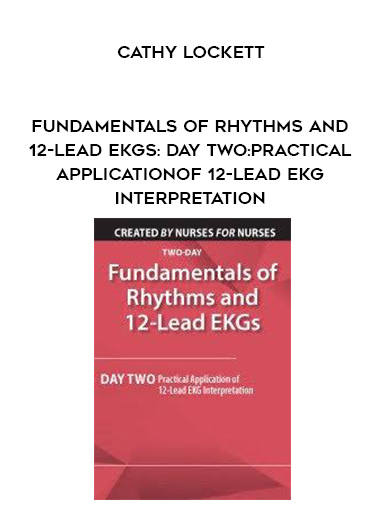FUNDAMENTALS OF RHYTHMS AND 12-LEAD EKGS: DAY TWO: PRACTICAL APPLICATION OF 12-LEAD EKG INTERPRETATION – CATHY LOCKETT
It’s two o’clock on a Sunday morning and you are the Charge Nurse on a 24-bed telemetry/Med Surg Unit. Mrs. J, in room # 312, is on telemetry and her low heart rate monitor alarm goes off.
You assessed her and note she is hemodynamically compromised with a BP of 74/42, cool and clammy skin and complaints of dizziness. What is the rhythm strip telling us about the patient? Do you know what do next?
Know what clues to look for and what steps to take by attending this information-packed seminar. Leave with a clear understanding of and be able to recognize basic and advanced cardiac dysrhythmias. Learn the systematic approach to EKG interpretation, with advanced skills in differentiating ischemia from infarct on the EKG, identifying STEMI imposters and many other causes of abnormal EKGs. Use these skills to improve patient outcomes for patients like Mrs. J and others you see in practice by being able to anticipate treatments and complications.
Objectives
- Relate the pathophysiology of supraventricular arrhythmias and accurately identify.
- Examine the 12-Lead EKG and diagnose the type of MI and the coronary artery involved.
- State the treatment modalities of Acute Coronary Syndrome.
- Differentiate STEMI imposters from NSTEMI upon EKG evaluation.
- Differentiate wide complex tachycardias.
- Identify three common STEMI imposters and differentiate between benign and injury patterns of ST segment elevation.
Outline
12-Lead EKG Interpretation: When is it necessary to acquire an additional EKG?
- Utilize a systematic nine-step approach to evaluate EKGs
Hex-Axial System: How to Calculate axis and Why
- Determine electrical axis using different techniques
- Establish causes of abnormal axis
- Utilize axis in disease diagnosis
Intraventricular Conduction Delays: Chronic or Acute/Causes and Treatment Strategies
- Left Bundle Branch Block
- Right Bundle Branch Block
- Hyperkalemia
- Hemiblocks (Fasicular Blocks)
- Left Anterior Hemiblock
- Left Posterior Hemiblock
Pathophysiology of Acute Coronary
Syndrome: Patterns of Myocardial Ischemia and Infarction on EKG
- ST segment /T wave changes
- Reciprocal changes
- Subtle clues
- Cardiac enzymes
- AHA guidelines for treatment of Unstable angina, NSTEMI, STEMI
STEMI Imposters: Is it a STEMI or just an Imposter?
- How to identify on the EKG
- Common STEMI imposters
- Broken Heart Syndrome
- Prinzmetal Angina
- Left Bundle Branch Block
- Left Ventricular hypertrophy
- RV paced rhythm
- Pericarditis
- Early repolarization
Wide Complex Tachycardias: Is it Ventricular Tachycardia or SVT with Aberrancy?
- Best leads for detecting
- Tricks of the trade to differentiate
- Utilize axis to determine
- Don’t forget: Treat the patient not the monitor!
Pre-Excitation Syndrome: How to Recognize WPW Syndrome on EKG
- Prevalence
- Pathophysiology: Differentiate antidromic from orthodromic
- Treatment modalities
Tag: Fundamentals of Rhythms and 12-Lead EKGs: Day Two: Practical Application of 12-Lead EKG Interpretation – Cathy Lockett Review. Fundamentals of Rhythms and 12-Lead EKGs: Day Two: Practical Application of 12-Lead EKG Interpretation – Cathy Lockett download. Fundamentals of Rhythms and 12-Lead EKGs: Day Two: Practical Application of 12-Lead EKG Interpretation – Cathy Lockett discount.






